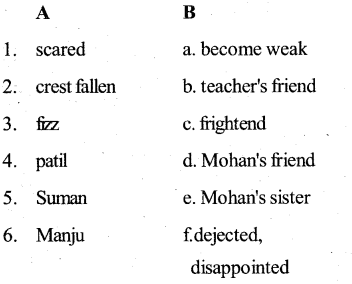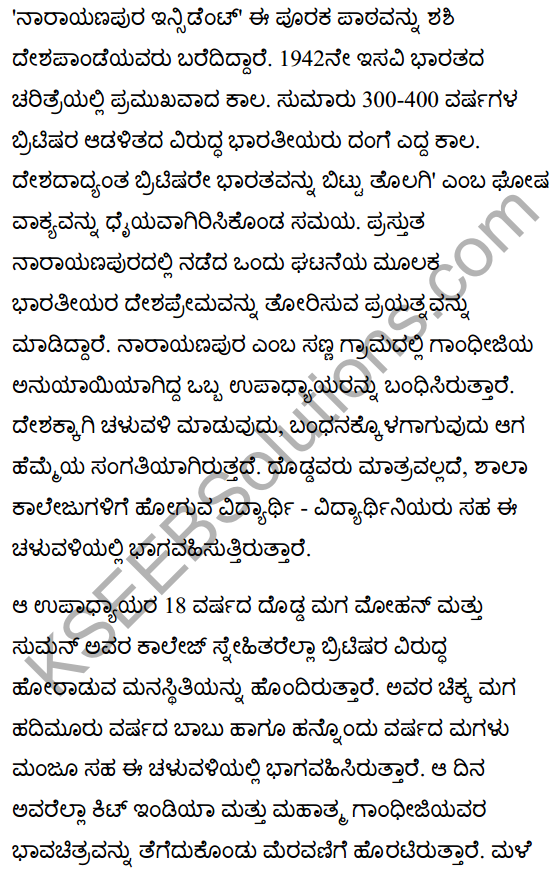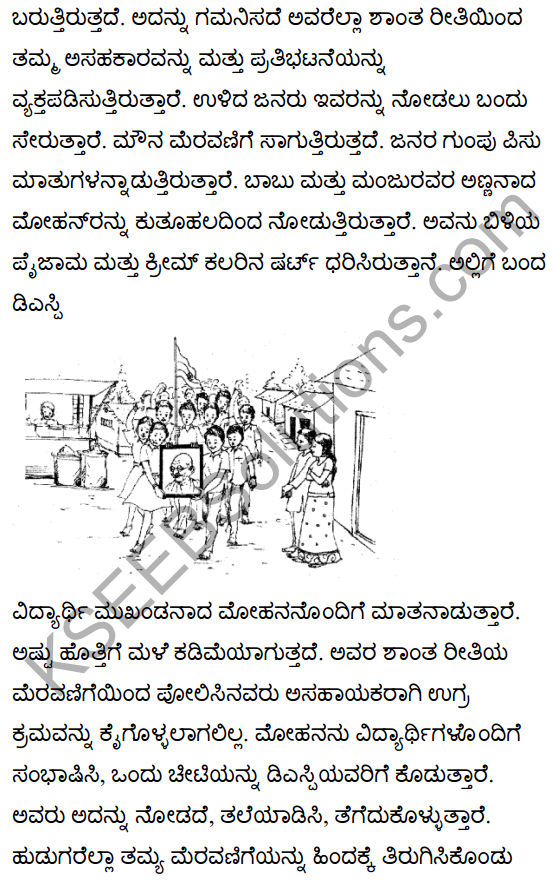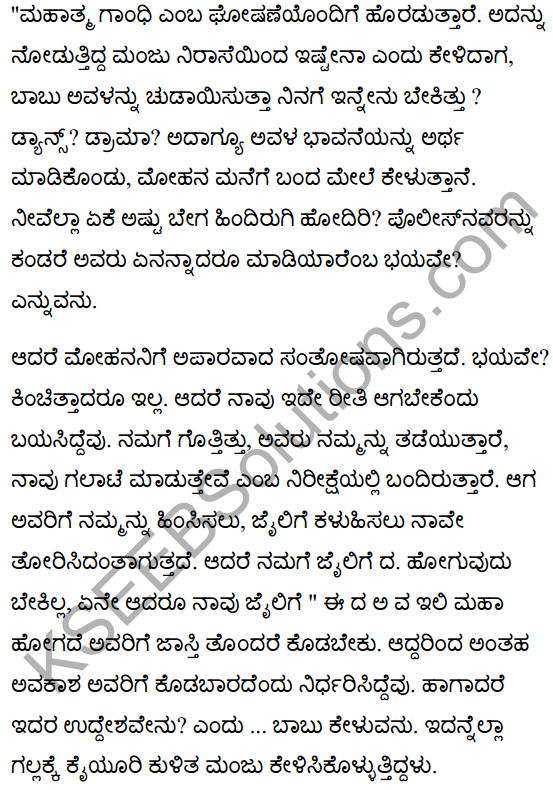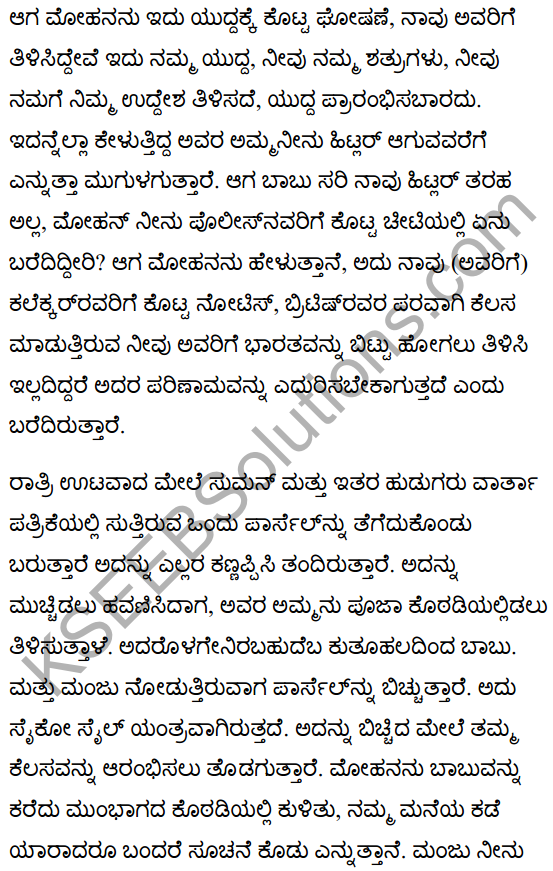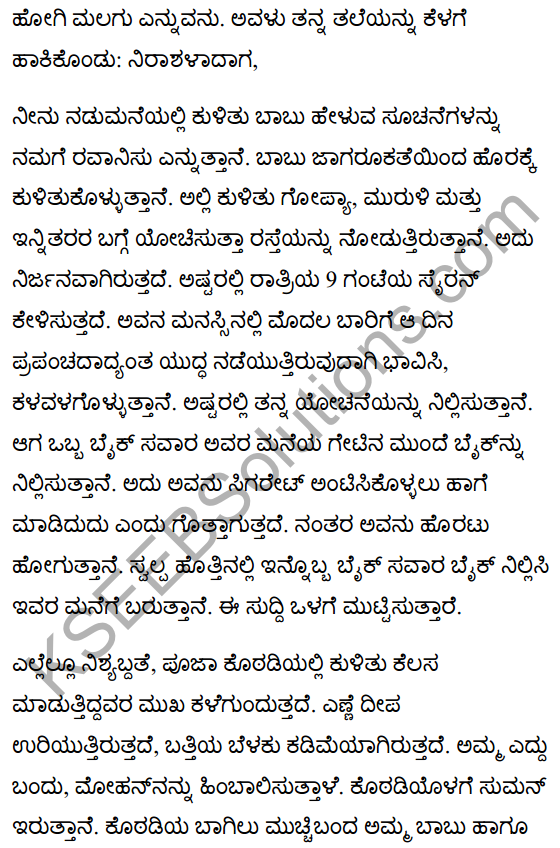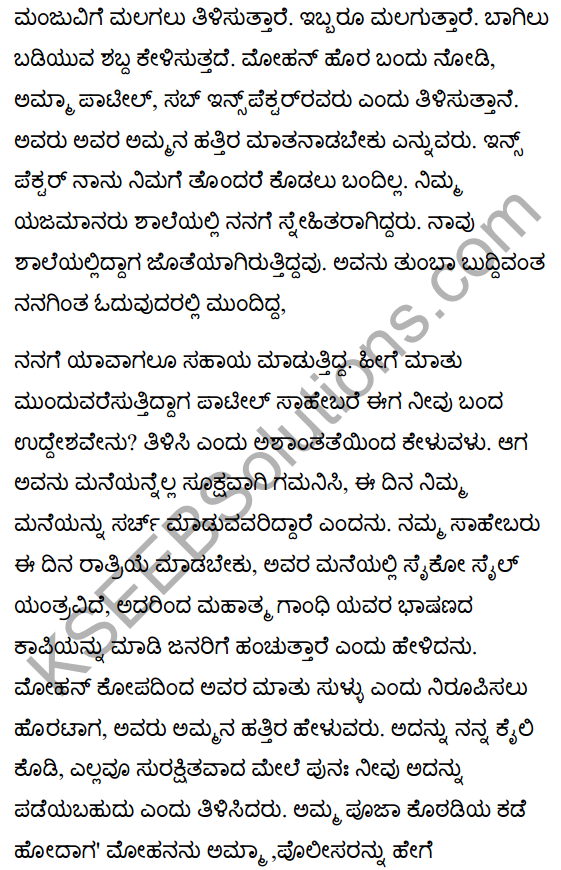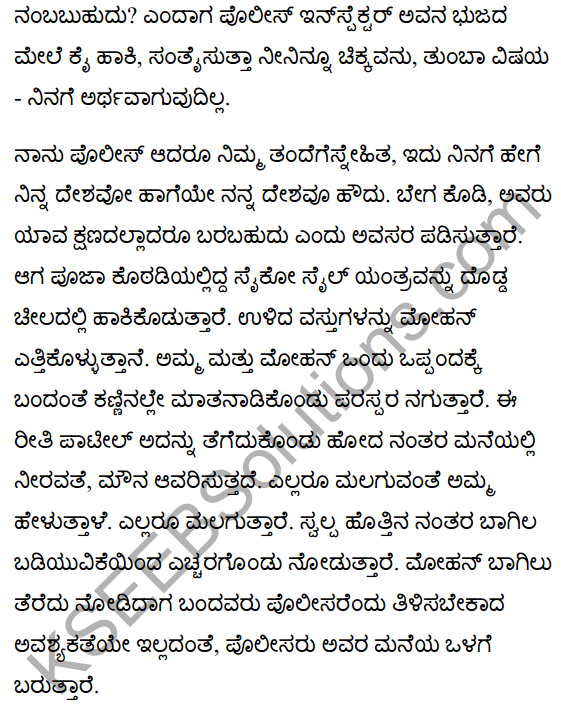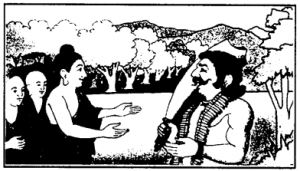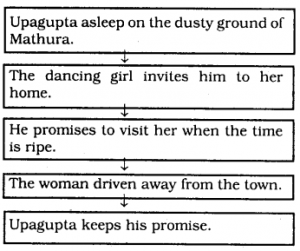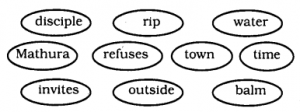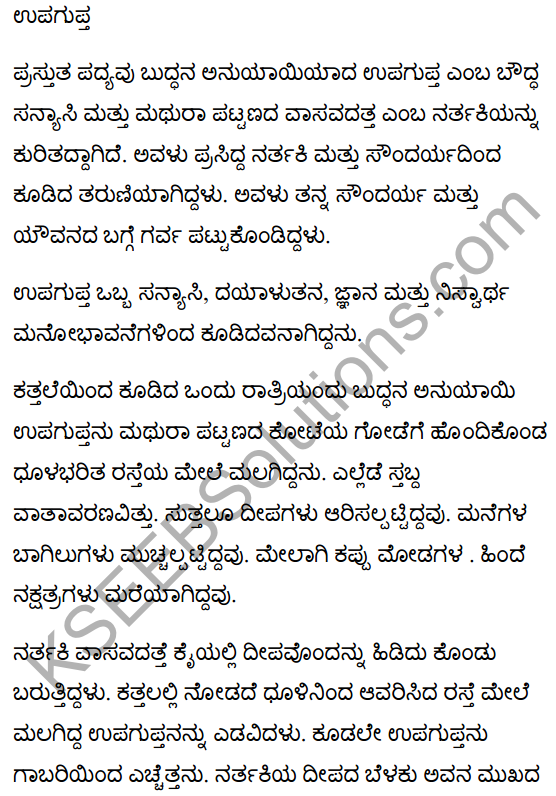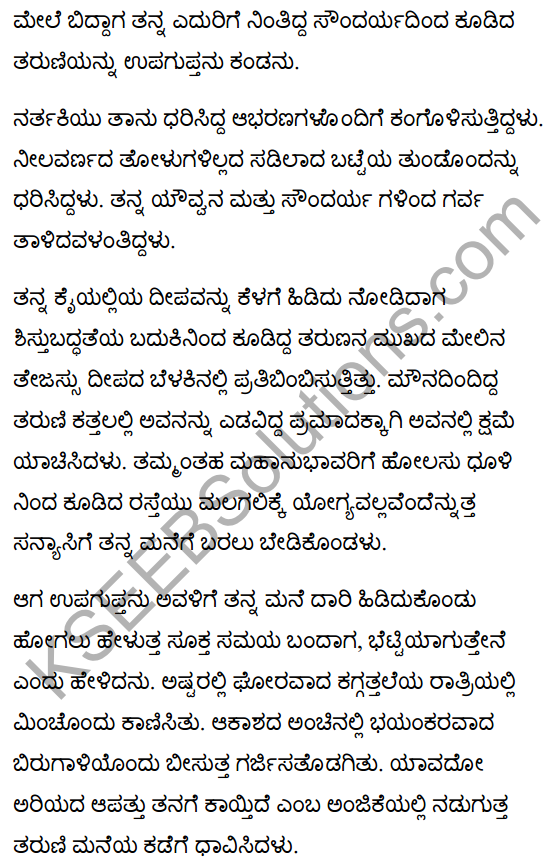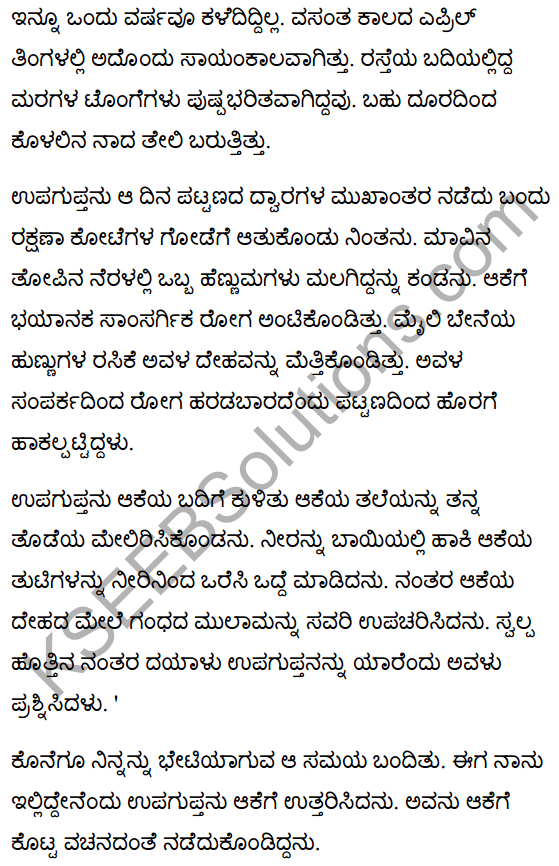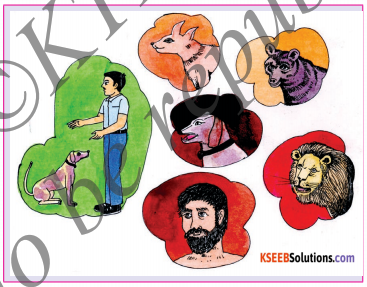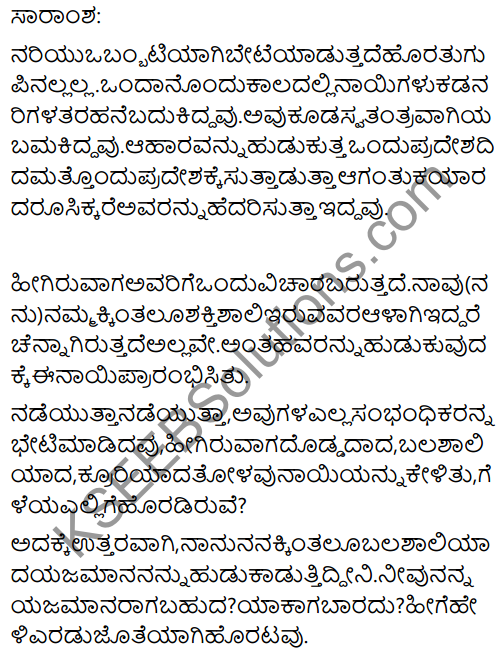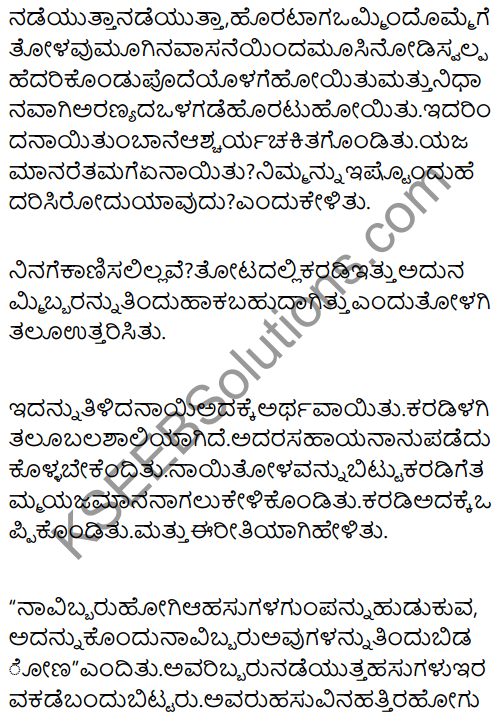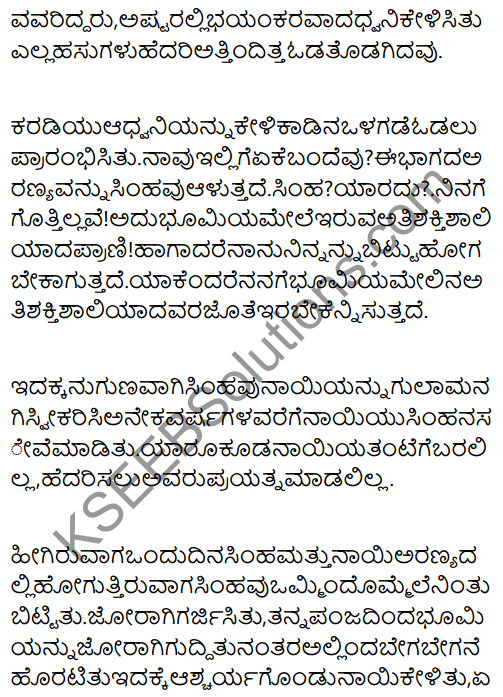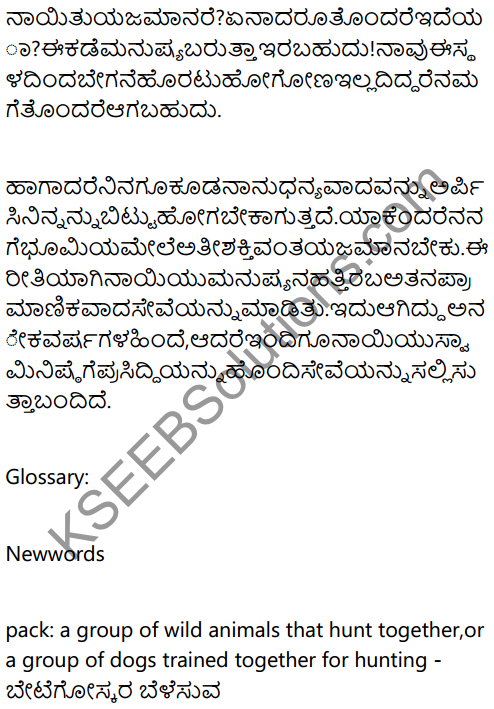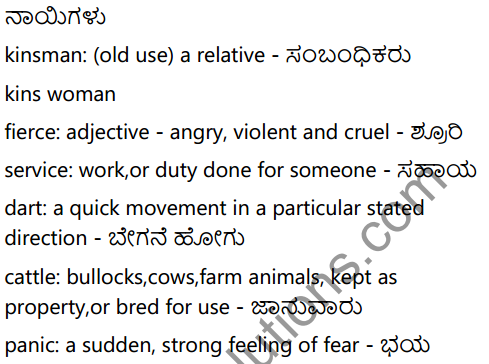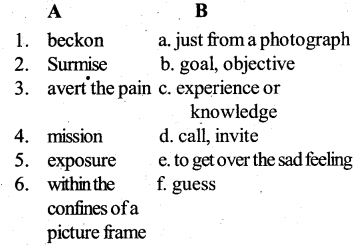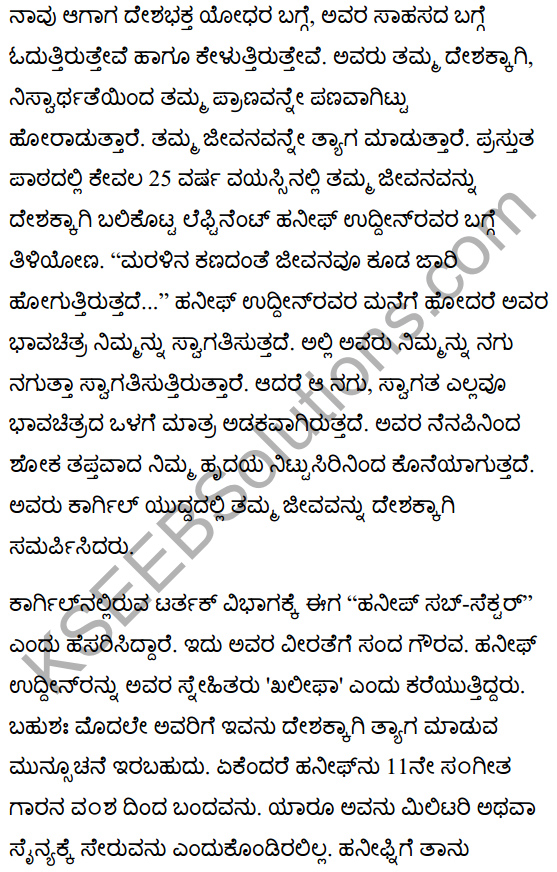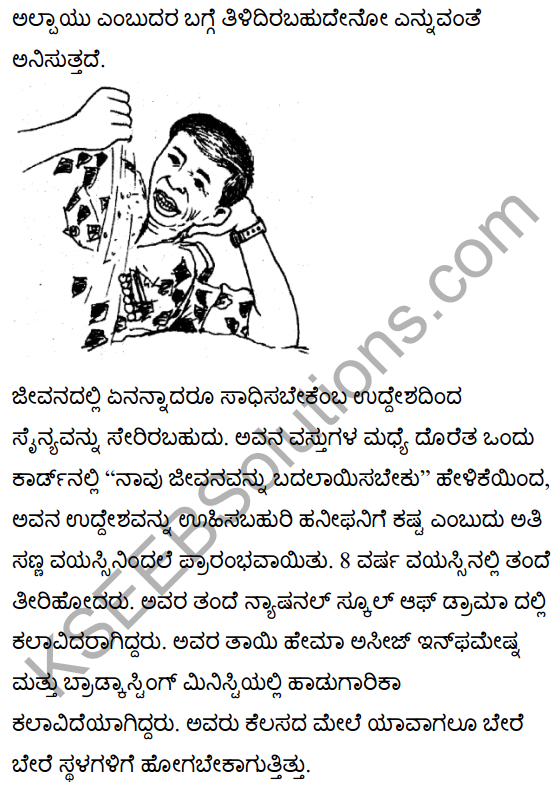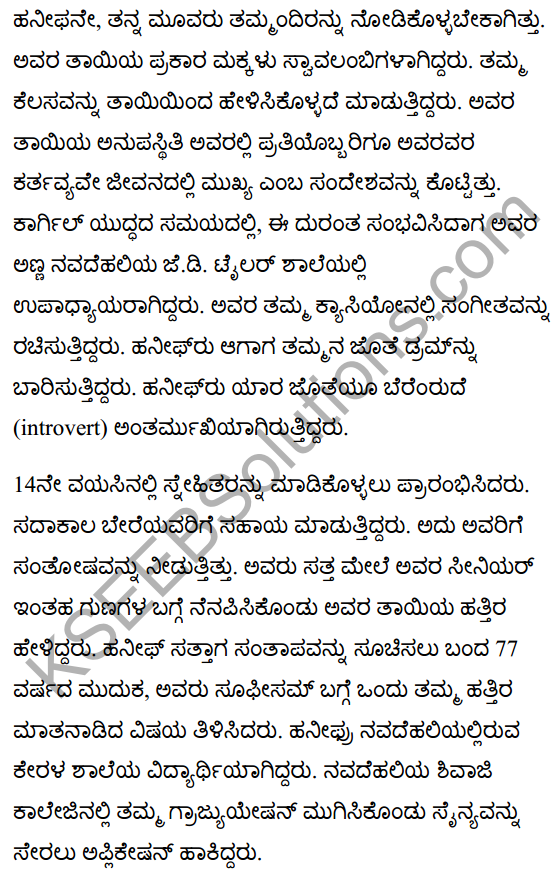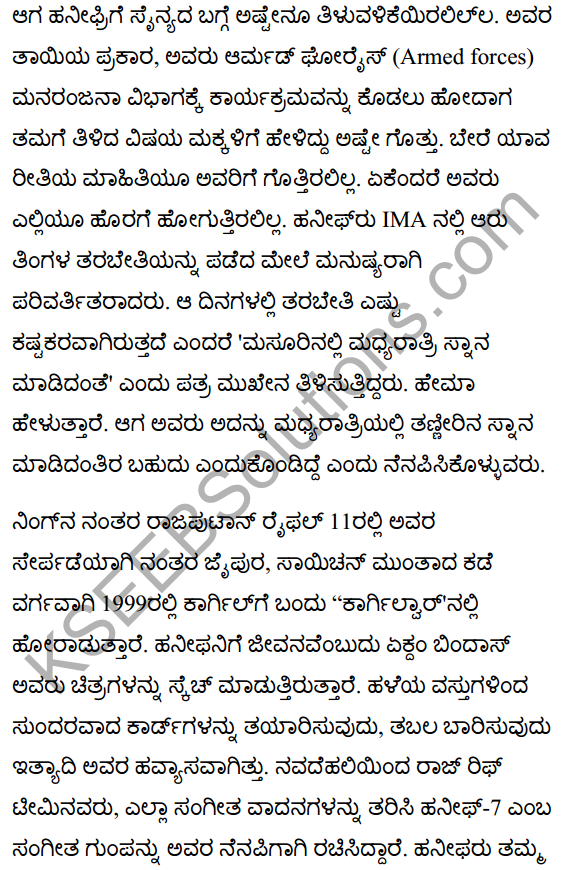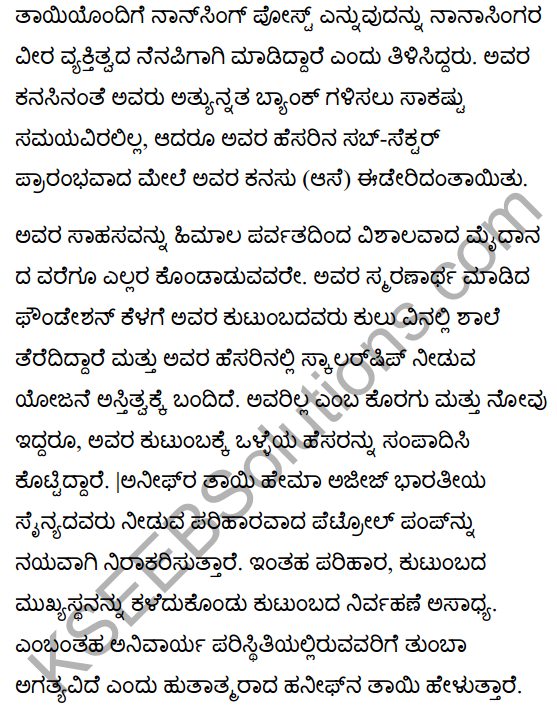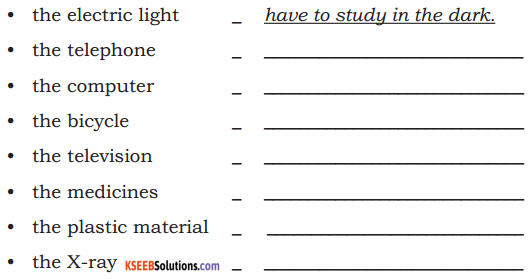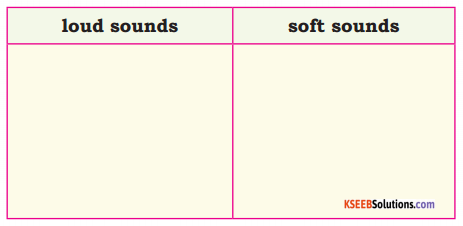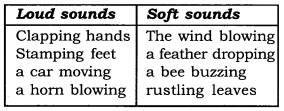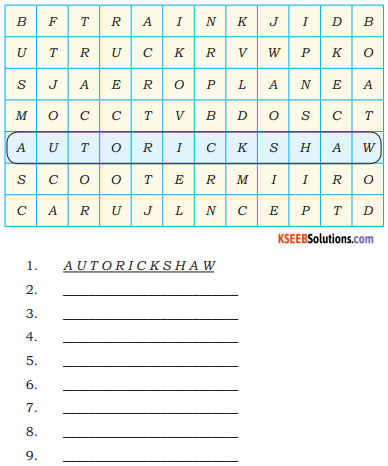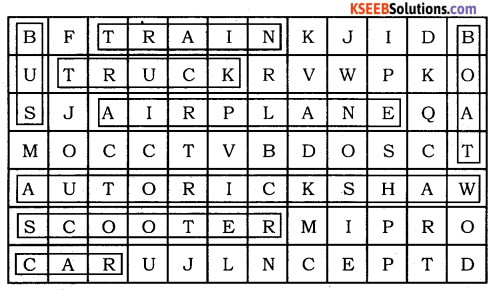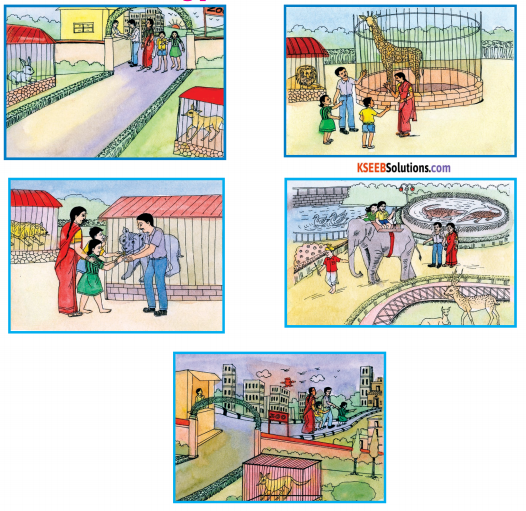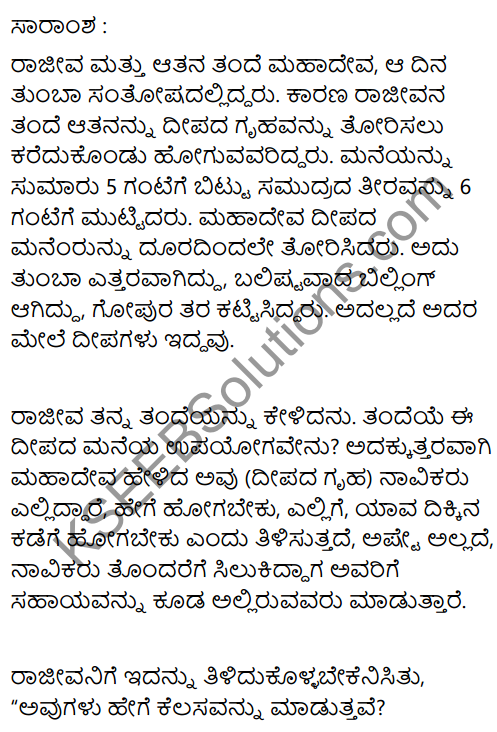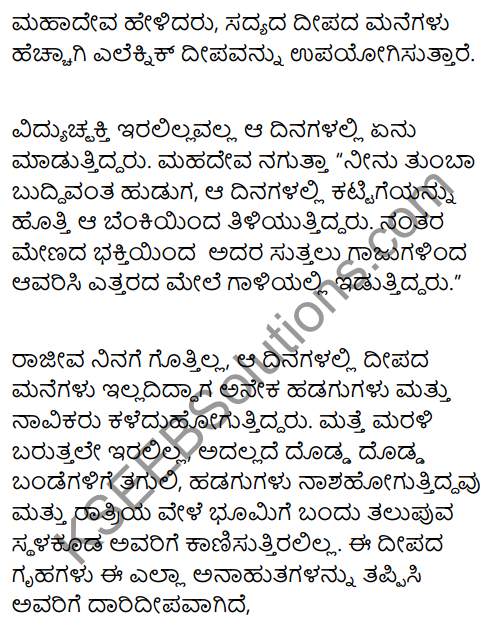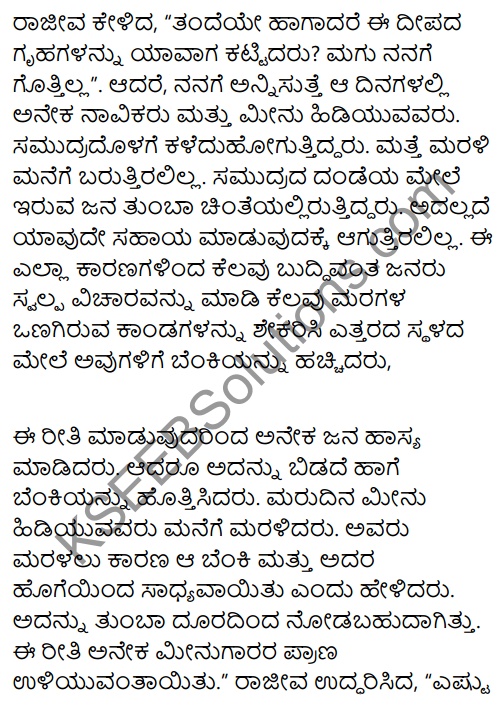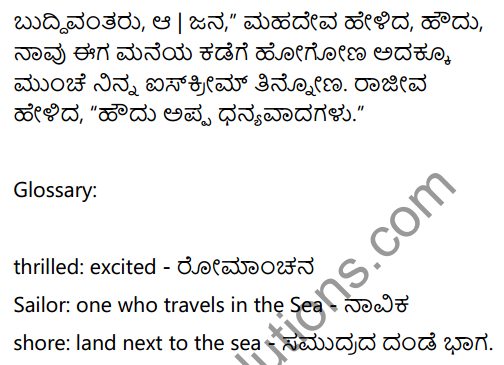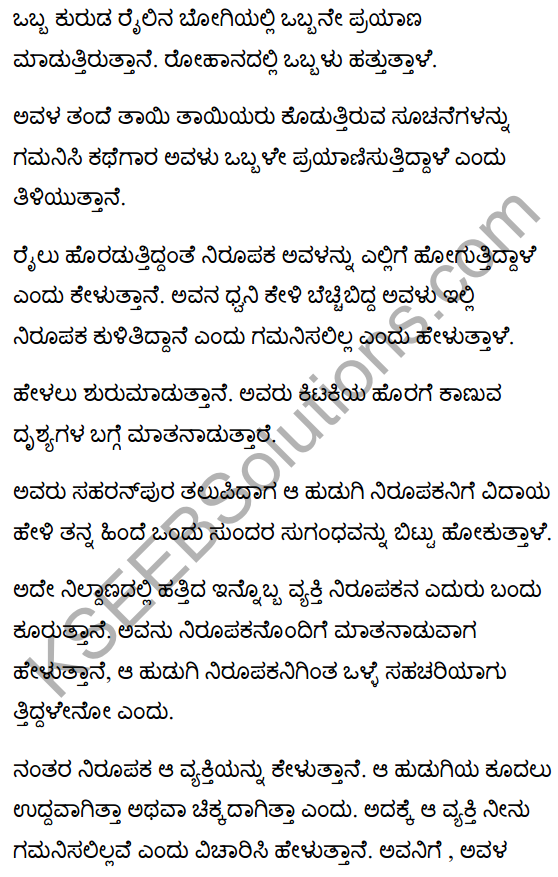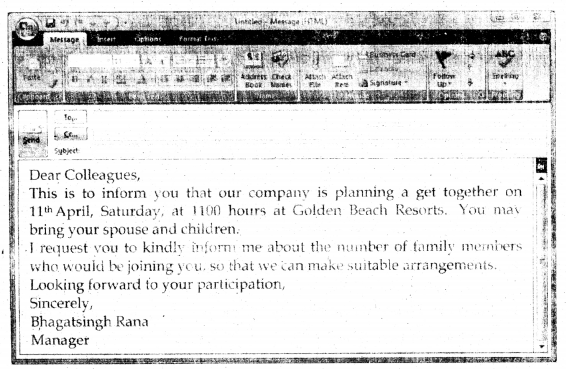Karnataka 1st PUC English Workbook Answers Articulation Language Functions
We use language for a variety of formal and informal purposes, and specific grammatical structures and vocabulary are often used with each language function. Language functions refer to the purposes in which we use language to communicate. A language function can be defined as “the use to which language is put. the purpose of an utterance rather than the particular grammatical form an utterance takes” There are hundreds of language functions. Let us get familiar with some of them.
![]()
When we meet people we begin the communication process by greeting each other. Sometimes we may have to introduce a friend or a colleague who is with us. At the end we take leave or bid farewell. We use formal language when we meet someone in authority, business associates, strangers and people in official positions. Informal language is used when we meet close friends, relatives and members of the family.
I. Starting a conversation with a stranger
Sometimes we need help from strangers. How do we start a conversation with them?
While travelling in a train :
Suma : Excuse me. can I ask you for a favour?
Rita : yes what is it?
Suma : (have travel sickness. Would you mind if I sit beside the window?
Rita : No? Not at all.
Suma : Thank you. Dv the way. I’m Suma.
Rita : Ini Rita. Nice to meet you.
Asking for Directions:
Joyce : Excuse me, could you tell me where the bus station is?
Mary : There are two bus stations here, one for the Private buses and another for government
buses. Which one would you want?
Joyce : The government bus station, please.
Mary ‘ : lt’š just Haifa kilometer from here. Go straight and take a right turn after the circle. It’s just there.
Joyce : Thank you. Have a good day.
![]()
Expressions to be used:
1. Excuse me, …………… ?
2. I hope ou don’t mind my / me asking, but ……………
3. Excuse me asking but …………… ?
4. Sorry to trouble you. but ……………
5. I beg your pardon, but ……………
6. Do excuse me, ……………
7. Terribly hot / windy / cold, isn’t it?
8. Would you mind …………… ?
9. Hi! Great party / music, isn’t it?
10. Forgive me for asking, but ……………
Activity 1:
Fill in the blanks with suitable expressions:
Meeting in a bus
Monica : …………… do you mind if I keep my luggage below your seat?
Shaila : …………… at your convenience.
Monica : Thank you very much.
Answer:
Excuse me; No problem, do
Activity 2:
Write a conversation of your own based on the picture below;
A student in a stationery shop
…………..
Student : Can I see different types of……….. ?
Shopkeeper : Yes,
Answer:
Excuse me, Pen sets; of course, Please come with me.
Activity 3:
Based on the picture below write a dialogue:
……………
Patient 1 : ………………… Is this …………………
Patient 2 : …………………
Ans.
1 : Sorry to trouble you, but; clinic very expensive? I am coming here for the first time.
2 : No Madam. Their charges are very reasonable.
Activity 4:
Sagar meets Vidya in a party held at Dixit’s house. How would he start a conversation?
Fill in the blanks
Sagar ………………….. Are you related to the Dixit’s?
Vidya : Hi! No, but……………..
Sagar : You are looking …………..
Vidya : Thanks for your compliment.
Answer:
Hello, I am working with Sheila Dixit, beautiful.
![]()
Activity 5:
How do you start a conversation with different kinds of people?
……………
Answer:
………………
2. Making Requests : –
In this unit we learn how to make and respond to requests.
| Formal | Informal |
| Do you think it would be possible…….. Could you possibly……. We would be grateful if…….. I hope you don’t mind me asking I’m sorry to trouble you…. |
You couldn’t……. could vou? Can you…………… , please? Will you do me a favour and…. You haven’t got…… have you? Will you/ would you/could you. please? Mind doing……… ? |
(Ravi goes to his General Manager Mr. Kamath with a request for 10 da’s leave.)
Ravi : Good morning sir.
Mr. Kamath Good morning Ravi. What’s the matter? You look worried
Ravi : My son is unwell and needs to have an operation. I’d be grateful if you could permit
me to take 10 days leave.
Mr Kamath: That shouldn’t be a problem. Mr Das can take care of our projects while you’re away.
Ravi : Thank you very much sir.
Mr. Kamath: You’re welcome Ravi. Don’t worry. Your son’s going to be fine.
![]()
Activity 1:
Sarala asks her nephew to help her with a heavy suitcase while boarding a bus. With the help of the
expressions given in the box. develop a dialogue between Sarala and Naveen
Sarala : Naen. can you ?
Nacen: …………….
Sarala : …………….
Naveen : …………….
Answer:
SamIa : Naveen. can you help me9
Naveen : Yes Aunt. What do you want?
Sarala : Please keep this suitcase in the luggage box.
Naeen 0K I will do that.
Activity 2:
Mr. Keshav buys a book from a book shop. He requests the shopkeeper to
gift wrap it for him. Write a conversation between them.
Shopkeeper __________
Mr. Keshav . ________
Shopkeeper : ________
Mr. Keshav ________________________________
Shopkeeper : _____________________________
Mr:Keshav : ___________________________________
Answer:
Shopkeeper : What can I do for you?
Mr: Keshav : I want to get this book gift wrapped.
Shopkeeper : Please give me the book,
Mr. Keshav : Here it is.
Shopkeeper : Wait a minute. please.
Mr: Keshav : Thank you very much.
3. Expresšing Gratitude :-
‘Thank you’ is one of the magic words in the English language. It spreads smiles on faces.
Sumod is waiting at the bus-stop. His friend, Rarnamurth going the same way stops his bike.
Rarnamurthy: Hi., Sumod Waiting for the bus9
Sumod : Hi, Ramamurthy. Yes. It is getting late to College,
Ramamurthy : Don’t worry. I am going the same way. Can I drop you?
Sumod : (getting on the bike). Thanks.
(getting do’D) Thank you. See you. Be.
Ramamurthy : It’s OK. See YOU.
At the Bank :
Joe Could you lend me your pen for a moment, please’
Abdulla : Oh. sure.
Joe : (After filling the cheque.while returning the pen). Thank you.
Abdulla : You are welcome.
At the College :
Gururnurthy, lecturer in English is talking to Murugesh
Gunimurthv: AW Murugesh, you have scored only 50 marks in the English paper, What is (he matter?
Murugesh: Sir, somehow, I get confused with the grammar part, sir, I don’t know what to do.
I practice a lot at home. But, still…
Gurumurthy : Don’t worry. Meet mc in the staff-room during the break. I.et us see what we can do
Murugesh : It is very kind of you, sir. Can I meet you around 3 O’clock today. Sir’
Gurumurthv: Sure.
Murugesh: Thank you, sir.
Expressions for thanking you.
| Formal | Informal |
| It is very kind of you. It is very nice of you. I am grateful to you. |
Thanks. Thank you. Thank you very much. Thanks a lot. |
Complete the following conversations.
Old woman :………………… help me cross the road?
Young man : Certainly,……………….
Old woman: …………….
Answer:
Will you
It’s my pleasure.
Thank you.
![]()
Between two friends:
Harish : …………. Prakash, how are you doing?
Prakash : I am fine …………. How about you?
Harish : I too am fine ………….
Answer:
Hello
Thank you.
It is very nice of you. Thank you.
Father and daughter: –
Father : Hi, Amudha, see what I’ve bought for you.
Amudha : What’s it dad?
Father : Oxford English Dictionary.
Amudha : Oh! It’s a wonderful Dictionary , dad.
Answer:
Thank you very much .
A passerby and a man on the street :-
Passerby : Excuse me, Is there any hotel nearby?
Man . : Vegetarian or non-vegetarian hotel?
Passerby : Vegetarian one.
Man : Yes, there’s one in Pampa Square.
Passerby : Is that one very far?
Man : No, no. It’s close by. Take the first right and walk a few steps. You’ll find hotel Adithya
to your left; That is the place you want.
Passerby ……….
Answer:
Thank you very much Sir.
How would you express your gratitude in the following situations?
A. Your bike breaks down. A passerby gives you a lift.
B. You are travelling by train. One of the passengers moves a little and makes room for you.
C. You have been asked to submit the filled in Scholarship Application form the next morning. But you do not have certain certificates. The Principal of your College, gives you some more time to submit the application form, on your request.
D. You are about to return home from College. It’s rather late. You realise you won’t be able to get a bus to go back. Then one of your friends drops you home on his way back.
E. You are waiting at a bus stop with a colleague. Someone snatches your handbag and runs away. Your colleague runs after the man and gets the handbag back.
Answer:
A. Thanks a lot.
B. Thanks / It is very kind of you.
C. Thank you very much Sir.
D. Thanks buddy.
E. Thank you very much.
![]()
4. Complimenting and Congratulating
When would you use the following expressions?
1. What a beautiful dress you are wearing!
2. It was great to hear that you got a distinction!
3. How smart the boy looks!
4. I would like to congratulate you on your success!
5. Let me congratulate you on your promotion as Manager!
Note: We compliment a person on his/her looks, dress, appearance etc .We congratulate someone
on winning something, scoring well in the exam, getting d job or promotion etc …
1. Shvam : That’s a very nice coat you are wearing!
Ramesh : Thank you.
2. Anu : You look stunning in this pink saree!
Suman : Thanks for the compliment.
3. Paul : Suresh, congrats! Your English has improved a lot!
Suresh : It’s very nice of you to say so. Thank you very much.
| Formal | Informal |
| May I say how………. If I may say so………. Please accept my compliments…… |
That is/was a nice/smart What a nice / smart / wonderful/ beautiful… Oh! It’s a beautiful … Wow! You look ……. |
Fill in the blanks with appropriate expressions given in the brackets below.
(Wow! You look great… / May I compliment you on this / May I say how …. )
1. Mr. Arun : …………… enlightening your speech was.
Principal : Thank you.
2. Sneha : …………… now that you are using lenses instead of spectacles.
Megha : Thanks.
3. Ambassador : You have taken great care to beautify your city……………
Minister: Thank you.
Answer:
1. It May I say how
2. Wow ! you look great
3. May I compliment you?
Congratulating:-
Mother: How was your day at school, Vivek?
Vivek : It was wonderful, mom. I have been made the President of the English club.
Mother : That’s great! Congratulations!
Vivek : Thank you, mom.
| Formal | Informal |
|
|
I would like to congratulate you on your performance at the Sports Meet.
I would like to congratulate you for your success at the Sports Meet.
Note: Do not use the expression ’Congratulations for …. This is an incorrect usage.
![]()
Activity 1:
Provide an imaginary situation for the following expressions.
1. Well done! (informal)
2. Congratulations! We are proud of you (formal)
3. May we congratulate you? (formal)
4. Congrats! (informal)
5. We are happy for you (informal)
Answer:
1. You have won a prize (or) you made a good move in a game.
2. You have topped the school at the board examinations.
3. You have been selected to represent your college in a quiz competition.
4. You got a prize at the local singing competition.
5. You got a seat for the course of your choice at a prestigious institution
Activity 2:
Provide suitable dialogues for the contexts given below.
1. The Principal congratulates the Captain of the football team on winning at the state level sports meet.
Principal : __________________ :
Captain : ______ :____________
Answer:
Congratulations my dear boy. We are proud of you and your team mates.
Thank you very much Sir.
Activity 3:
2. Pushpa has got a seat in the Government Medical College. Mr. Shridhar, her neighbour, congratulates her.
Mr. Shridhar :_______________ _____________
Pushpa : Thank you very much.
Answer:
I congratulate you for getting a seat in Govt. Medical College.
![]()
5. Apologising and responding to an Apology
We apologise for doing something we ought not to have done.
We also apologise when we do not do something which we ought to have done.
Formal
(Ravi apologises to a senior colleague for not completing his work on time.)
Ravi : Mr. Naren, I must apologise for not completing the proposal on time. I was unwell.
Naren : That’s all right. But please complete it by next week.
Ravi : I certainly will.
Informal
(Anthony apologises to his aunt for not getting her a book she wanted)
Aunt : Have .you got me a copy of Leo Tolstoy’s “Crime and Punishment” ?
Anthony : I’m sorry I haven’t been able to, auntie. Actually it’s in short supply.
Aunt : Don’t let it bother you, Anthony.
| Formal Expressions | Informal Expressions |
| Tapologise I beg your pardon |
Very sorry So sorry Extremely Sorry Awfully sorry |
Activity 1:
Formal situation – Between a boss and a subordinate
Mr. Sampath : Sir, I went through the memo that was on my
table Last evening. I sincerely for
coming late to office often.
Boss : Yes.We expect you to correct yourself in future.
Mr. Sampath : 1 _______________ once again. I’ll
certainly be punctual from now on.
Boss : That’s it. This time your plea is considered. But
please remember, this is the last warning.
Answer:
apologise. apologise
![]()
Activity 2:
Informal situation – Between a mother and daughter
Tina Mummy. Pm __________ to have kept you waiting for so long.
Mother. My dear, didn’t I tell you to come soon?
Tina : So ______ -again. 1 thought I would complete the
assignment and then come with you,
Answer:
extremely sorry very sorry
Activity 3:
Create a conversation basai on the following picture:
Apologising to your friend for missing his/her birthday.
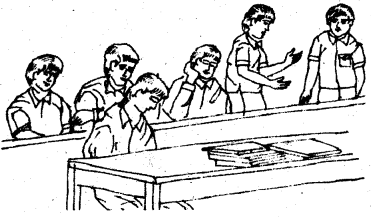
Answer:
Somu: Raju I am very sorry, I missed your birthday party. My cousins have come to visit us.
Raju : You could have brought them also to the party.
Somu : They had some work to get done here.
Raju : it is okay. But you missed all the fun and games.
Activity 4:
Apologising to your teacher for misbehaving in his / her class
.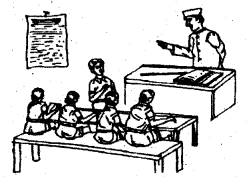
Answer:
Teacher : Raju stand up, why are you talking to Shekar, when I am doing the lessons?
Raju : Sorry Sir. Shekar had some doubts as he had missed school last week.
Teacher : Ok. but do that after school hours.
6. Expressing Sympathy:-
Expressing sympathy is to understand and care about someone’s problems and to show that we care for them.
Tanvi: You know Spoorthy, our classmate, Pavan, has been hospitalised. He met with an accident this morning while coming to College.
Spoorthy : Oh God! How sad!
Ranjith : May I know why you look so sad, Sir?
Teacher : I am really upset you know, my elder sister passed away.
Ranjith : I sympathise with you, sir.
Rakesh: Why do you look so upset?
Naveen : You know, I lost my mobile phone somewhere, this morning.
Rakesh: How sad! When did you use it last?
Naveen : While I was at the cash counter, I received a call. I was talking on the phone when the cashier gave me the cash. ‘
Rakesh: Why don’t you speak to the cashier? He may have some idea.
Naveen : That’s a good idea..
Some of the expressions that can be used to express sympathy are as shown below.
| formal | Informal |
| I am very upset to hear that… I sympathise with you. My sympathies are with you. |
How sad! That’s a pity. |
Activities .
1. Your friend had taken the Bank Officer’s Examination but has failed in the examination. You enquire why he is sad and express your sympathy. Write a dialogue between you and your friend.
2. Saleem, your class mate has lost his wallet on his way to College. You sympathise with him for the loss. Write a dialogue between you and Saleem.
3. What expressions do you use to express sympathy in the following situations?
a. One of your friends has lost his grandfather.
b. You hear from your Principal that one of your lecturers has met with an accident and is hospitalised.
c. On your way home, an elderly lady tells you that a man in a red shirt has snatched away her chain.
Answer:
1. Arya : Akshaya, why are you so sad?
Akshaya : I had taken the Bank officer’s examination. But I didn’t pass.
Arya : Oh ! how sad ! Don’t worry. Prepare well and you’ll have better luck next time.
![]()
2. Saleem : I lost my wallet on my way to College.
Me: That’s a pity. I am sorry for you. Do you have any idea where it could have happened.
3. (a) How sad! my sympathies are with you.
(b) Oh! my God! how sad!
(c) That’s a pity. I am very upset to hear that. Let us call the police.
7. Seeking Permission
You help an old woman cross the road, but after the good deed is done the old woman instead of thanking you chides you. She says, “I didn’t want to cross the road”. What do you think can be done now?
Let us list a few polite expressions that you can use to seek her permission to take her back.
I thought …………. , I might
Would it be all right if I
Kantesh : Can I borrow your camera this evening?
Anjana : I am afraid I can’t give you, because I need it this evening.
There are certain polite expressions like the following for refusing permission.
1. That’s not a very good idea.
2. bio, please don’t.
3. I would rather you didn’t
4. I am sorry, that’s not possible.
Manu : Renu, I lost my mobile. Mind if I use yours?
Renu : No, not at all. You can use it.
Manu : Can I keep it for a few hours?
Renu : Oh! Sure.
Peter, Secretary of the Students’ Union, meets the Principal.
Peter :-Good morning Sir.
Principal : Good morning. Were you able to contact the speaker of today’s function?
Peter : Yes sir. Mr. Ravi has agreed to come and speak at the function. Would it be possible to
send our College vehicle to pick him up sir?
Principal : I am afraid it is not possible. You better hire a cab. We will pay the fare.
| Language Function |
Formal | Informal |
| Seeking Permission |
Would it be all right if I. … May I have your permission…. I thought I might |
Mind if I sit on this….. Could we borrow …. |
| Giving Permission |
Yes, permission is granted. We are pleased to permit…………… |
Go ahead. Be my guest. It’s all right. Please go ahead. Of course you can. |
| Refusing Permission |
No, please don’t. I would rather you didn’t I am sorry, that’s not possible |
I am afraid I can’t… Sorry that’s not…. I would like to, but I can’t |
![]()
Activities
1. Student : Sir, can I leave the College early today?
Principal : (refuses permission)
Student : It’s an emergency sir. My brother has met with an accident.
Principal: (grants permission)
2. Ajay :
(asks Arati’s permission to use her vehicle to go to the art exhibition)
Afati : I don’t think I can give you my vehicle because I need to go to the dentist.
Ajay : …………..
Answer:
1. Student : Sir, can I leave the College early today?
Principal: I am sorry that’s not possible (refuses permission)
Student : It’s an emergency sir. My brother has met with an accident.
Principal: In that case, you may go (grants permission)
![]()
2. Ajay : Could I borrow your vehicle to go to the art exhibition?
(asks Arati’s permission to use her vehicle to go to an art exhibition)
Arati : I don’t think I can give you my vehicle because I need to go to the dentist.
Ajay : Ok. It is alright. I will ask Deepik.
3. Rearrange the following dialogue between Henry and his class teacher to make a meaningful conversation and rewrite it in the space provided.
Yes, you may. When is the competition?
Good morning. Is anything the matter?
Sir, may I leave the College early today? I am competing in the Inter-collegiate painting competition.
Thank you, sir.
At two in the afternoon.
Good luck.
Good morning, sir.
Answer:
Henry : Good morning Sir.
Teacher : Good morning. Is anything the matter?
Henry : Sir, may I leave the College early today? I am competing in the Inter – collegiate painting competition.
Teacher : Yes, you may. When is the competition?
Henry : At two in the afternoon.
Teacher: Good luck !
Henry : Thank you, Sir.
![]()
8. Introducing
Meena and Rita are on their way home. They meet Meena’s friend Wilson. Meena greets him and introduces him to Rita.

Study the above picture and develop a conversation.
Answer:
Meena : Hello Wilson!
Wilson : Hello! How are you?
Meena : Fine; Thank you. Rita, this is Wilson and Wilson this is Rita.
Wilson : Good morning! Rita.
Rita : Oh! Good morning, Mr. Wilson. Nice meeting you.
![]()
Compare the above dialogue with the example given below.
Mrs. Kharina : Good morning Mr.Ashok.
Mr. Ashok : Oh, good morning Mrs. Khanna. It’s a lovely day, isn’t it?
Mrs. Khanna : Yes, it’s beautiful. Mr.Ashok, may I introduce my nephew Gagan? He’s staying with us for the weekend.
Mr. Ashok : How are you Gasan?
Gagan : Fine, thank you Mr. Ashok.
Mr. Ashok : I’m in a hurry Mrs. Khanna. Let’s meet later.
Mrs. Khanna : Yes. Carry on Mr.Ashok.
Mr.Ashok : Good bye Gagan. I’m so glad to have met you.
Gagan : I’m glad to have met you too, Mr.Ashok. Good bye.
Mr.Ashok ; Good bye then, Mrs.Khanna. Please give my regards to Mr. I Qianna.
Mrs. Khanna : Yes, I will. Good bye.
Some common expressions for greeting
| Formal | Informal |
|
|
Anup goes to play cricket. There he meets his friend Raju. Raju introduces his neighbour Manoj to Anup.
Anup : Hello Raju.
Raju : Hi Anup. Meet my neighbour Manoj. He’s in the College cricket team.
Anup : Hi Manoj. Glad to meet you.
Raju : But we must be going now. Meet you again. ,
Manoj OK, bye. Take care.
Complete‘the following dialogue between Madan and Mohan. Mohan has recently moved in as Madan’s neighbour.
Madan : Mr. Mohan. How
Mohan : Thank you. .
How Mr. Madan?
Madan : I’m fine We’re happy to have you as our neighbour. Do come home sometime.
Mohan : Sure. I will .
Madan : Bye.
Answer:
Madan : Good morning Mr. Mohan. How are you ?
Mohan : Ok Thank you. How are you Mr.Madan?
Madan : I’m fine thank you. We’re happy to have you as our neighbour. Do come home sometime.
Mohan : Sure. I will. I must be going now. Bye.
Madan : Bye.
Activity 2
Work in pairs: Imagine a situation where your father meets your Principal. Write a dialogue between them about your academic progress, where the Principal appreciates your hard work.
Parent : Hello sir, good morning.
Principal : Good morning, welcome. Please come in.
Parent : Sir, I am Jagan and my son Kiran is in X ‘B’ I want to know about his progress.
Principal : He is OK. Your son is a very good student and a hard working boy.
Parent : I am happy. Thank you very much sir.
Activity 3
Rearrange the pieces of dialogue in the boxes in meaningful order.
Deepa: Hello Geetha. You look so fresh and lively. What’s the matter?
Deepa: 0. K. Bye.
Geeta: I must be leaving now. See you later. Bye.
Geeta: Hi Deepa, I am practising yoga. It makes you feel light and fresh.
Deepa: Wonderful Geetha.
Answer:
Deepa: Hello Geetha, You look so fresh and lively. Whats the matter?
Geetha : Hi Deepa. I ain practising yoga. It makes me feel lively.
Deepa : Wonderful, Geetha.
Geetha : I must be leaving now. See you later. Bye.
Deepa : OK Bye.
![]()
Activity 4
Two friends meet and discuss their achievements in the Annual sports meet. Create a dialogue between them and enact it in the class.
Answer:
Mamatha: Hello Akshav
Akshaya : Hi Mamatha, How arc you’
Mamatha: Fine,thankyou.I came fìrst in the l00 meter srace for lPU and second in the 200 metres.
Akshaya : Congrats, for your achievements in the annual sports meet. You know our team
won the first prize in throw ball.
Mamatha: Thank you! and congrats for you and your team.
Activity 5 :-
Given below is a conversation in jumbled form under three columns. Rearrange the dialogues to
make a meaningful conversation and rewrite it in the space provided below.
(Lalitha and her friend Leda come home. Lalitha’s father is about to leave for work.)
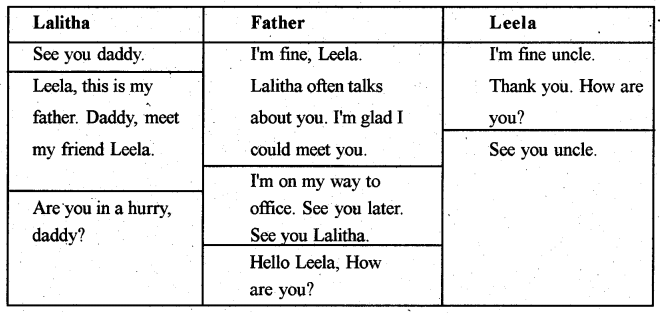
Answer:
Lalitha : Leda this is my father. Daddy, meet my friend Leda.
Father : Hellow Leda. How are you?
Leda I’m fine uncle. Thank you. How are you?
Father : I’m fine Leela. Lalitha often tálks about you.
I’m glad I could meet you.
Lalitha : Are you in a hurry, daddy?
¡kther : I’m on my way to office, See you later, See you Ialitha,
Leda : See you uncle.
Lalitha : See you daddy.
Activity 6 :-
Now practise writing dialogues with the help of the clues given below Uso your own surnames or names. In a group of three, take turns to be A, B or C.
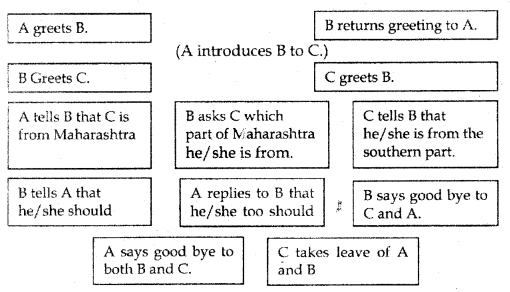
Answer:
A is Sornu
B is Raju
C is Prem W
Sornu Hello! Raju. How are out’
Raju : Hello! Soniu. Fm fine’?
Soniu : Raju. meet mv friend Prem.
Raju Hello! Prem.
Prem ‘Hello! Raju!
Sornu Raju, Prem is from Maharashra.
Raju : Is that so Prema9 Which part of Maharashtra are you from’
Prem I am from the southern part of Maharashtra.
Raju : Sornu. you should bring Prem home sometime.
Somu I will Raju. you also should visit us some time.
Raju . [am getting late for my karate classes. Bye.
Somu : I am in a hurry too. Bye Raju bye Prem.
Prcin : 0k. bvc Raju, bye Somu.
9. Leave Taking :-
Formal
It was a pleasure seeing you.
Goodbye.
Note: After 8 p.m. – Good night.
Informal :
Cheeriot
Goodbye / Bye.
See you (later).
Miss Jvoti runs into her old neighbour
Miss Joti Good Morning, Mrs. Kavita.
Mrs. Kavita : Good Morning. Jyoti.
Miss Jvoti How are you?
Mrs. Kayita : Very well, thank you
Miss. Jyoti : 1 think we’ve not met for a long time.
Mrs. Kaita : Yeah, I was with mv mother this summer.
Miss Joti : That’s great. But I need to go home now. See you later.
Mrs. Kavita : Good bye, Jyoti.
Vipul : Hi. Sanjavt
Sanjav : Hello VipuI! How are you doing’
Vipul : Really great!
Sanjay : Wow, you look so happy. What’s the matte?’
Vipul : Tomorrow is my birthday. We are having a party at Ashoka Hotel.
Sanjav : That’s really amazing! Happy birthday. Vipul
Vipul : Thanks. Please come to my party at 7 p.m.
Vipul : See you.
Pre-closing :-
- OK then..
- I’ve got to go now.
- So, I’ll see you next week.
- I think I’d better be going now.
- Well, it’s time for me to leave.
[think it’s already late. - I must be going home.
Closing I leave-taking :-
- Good bye.
- Bc-Bye; Bve Bye now; Sec you. Take care.
- See you later – Fine.
- See you soon – – 0K
- See you tonight – – All right.
- Good night.
![]()
10. Requesting for repetition :-
When we can’t hear / understand hat the oilier person says. e ask him/her to repeat For example.
tue teacher in your class asks ‘ou todo something But %OU have not heard it proper. What ould
‘ou do? A quiz master is conducting an inter-college competition.
1: No’, the question is hat is Mv sore famous for?
Ranvir : 1 beg our pardon sir.
2 : (repeats the question)
Ranvir : I am sorry. what did you say sir? Your voice is not audible.
3. (repeats the question) Are you able to hear now?
Ranvir: ‘as. thank ‘you sir More is famous for palaces.
| Formal | Informal |
| I beg your pardon. Would you mind repeating? May I ask you to repeat? |
I am sorry. I couldn’t hear. Pardon? What did you say? Sorry, I couldn’t follow. What was that again? |
What would you say in each of these situations?
1. You can’t hear the other person
2. You want him/her to repeat something
3; He/She is speaking too fast
Answer:
1. Sorry, I beg your pardon.
2. Would you mind repeating?
3. I am sorry I couldn’t follow. Kindly slow’ down a bit.
![]()
11. Asking for Information : –
I would like some information, please.
When you ask for information about a course, time of a train, a bus, etc., you can see people using the following expressions:
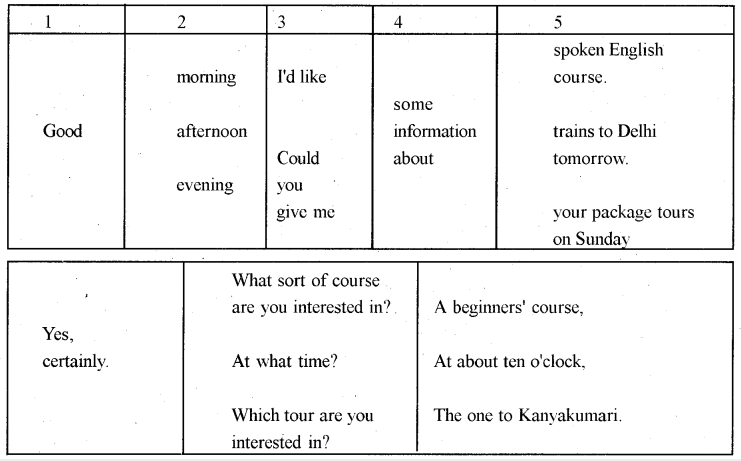
Practice:
Work in pairs. Take it in turns to ask for information using the situations and information given below: Person ‘B’ starts every time with “Good morning”, “Good afternoon”. Then, he or she gives the name of the school, place, etc.
Situation :
You want some information about English Courses.
A : ‘I’d like / Could you …………..about the courses this term?
B : What sort of courses are you interested in?
Excellent School of English
Courses this term:
- Beginners’ Courses
- Intermediate Courses
- Tourist Englis
- Cambridge Courses
- Business Courses
- Medical English
“Wh” Questions can be used to ask for more information.
Examples:
What did you do over the week end?
How was your trip?
When did you get back?
Who did you go with?
How many people were there?
Whose car did you drive?
![]()
When asking for details about a particular item you are considering buying, you can say
- Could you give me some information about this computer?
- Can you give me more details about the CD player?
- Could vou tell me how this vacuum cleaner works?
12. Offering to Help
There are different ways in which we can offer help to others in various situations in life.
Vimala has to go to the hospital to see her sister, There is nobody to look after her child. Her neighbour offers to help.
Vimala Oh’ I am in a fix,
Neighbour Is there something can do”
Vimala : Do you mind taking care of my bab for some time”
Neighbour : No. I dont mind.
Vimala : Thank you. it’s very kind you.
Principal : Is any one in this class arcade (o) introduce the chief guest in tomorrow’s function”
Rahul : Perhaps I could do it sir.
Principal : Thank you for the sour offer. But I am afraid you look sick. You may not be able to do that.
Rahul : Yes. I am. But I’ll manage sir.
Principal : Thank ‘ou, Rahul That’s the spirit
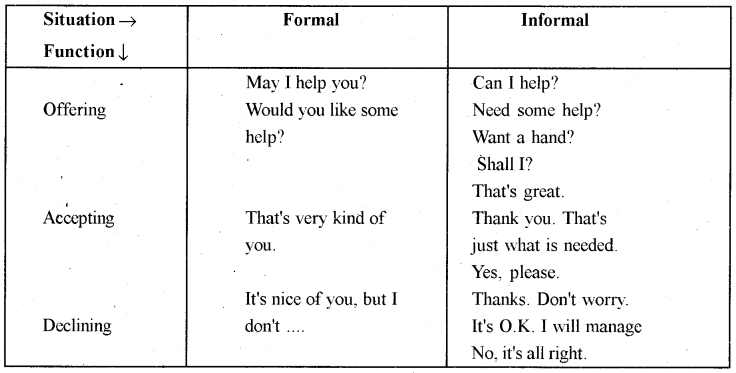
Activity 1:
Harini’s mother is sick. She couldn’t complete her assignment. Raima offers to help.
Harini : …………….
Ramya : Can I help you?
Harini : Please
Ramya : ………….
Ans. Harini : My mother is sick. I am not able to complete my assignment.
Ramya : Can I help you?
Harini : Please. Be with her for one hour. I will finish the assignment by then.
Ramya : OK.
![]()
Activity 2:
At the book stall an elderly man is struggling to read and copy the titles. Sourav offers to help him.
Old man : Oh! How forgetful I am. I have left my reading glasses.
Sourav : Sir, if you don’t mind
Oldman : I am so thankful to you son.
Sourav : ……….
Oldman : son, very
Ans.
Old man : Oh! How? forgetful I am. I have left my reading glasses.
Sourav : Sir, if you don’t mind, take my glasses and try.
Oldman : I am so thankful to you son. They seem Ok.
Sourav : Ok. Sir. It was nothing.
Oldman : Thank you my son, so very’ kind of you
Activity 3:
Look at this picture. Complete the dialogue between the old woman and the young man.
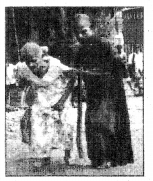
Young man : Can I Old ………………..
woman : Yes, ………………
Young man : May I hold your ………… ?
Old woman : God bless you.
Young man : No need to thank me. I have done my duty.
Answer:
Young man : Can I help?
Old woman : Yes. its ‘er’ kind of you.
Young man , Ma’s I hold your hands?
Old woman : 0k. God bless you.
Young man : No need to thank me. I had on done my duty.
13. Complaining :-
List a few situations where you feel like complaining.
(In the Principals chamber)
Teacher I’m sorry to say this, but some boys in that class are indisciplined.
Principal : Whats the problem’?
Teacher : Sir, some boys are irregular to mv class
Principal : Is it so? Who are they?
Teacher : I’ve listed their names.
Principal : 0K, I’ll look into the matter.
Expressions used to complain
| Formal (Generally in writing) | Informal |
| I regret to bring to your notice ……………………… |
Sorry, but.. .. I am sorry to say this, but,… I am sorry to trouble you, but…… |
Activity 1:
Make polite complaints in the following situations.
(a) You are studying for the examination. Your neighbour’s children are playing music very loudly.
(b) You have bought a mobile phone but the battery is not getting charged properly.
(c) You are sitting in a restaurant to have some tea but no one attends to you.
Answer:
(a) I am sorry to say this but if you reduce the volume it would be helpful for me to read for ! the examination.
(b) I regret to bring to your notice that the Samsung mobile phone which I bought from you is not getting charged properly. Please change it and provide a new one.
(c) Excuse me, I have been sitting here for the past 10 minutes, but no one is attending to me.
![]()
Activity 2:
What expressions would you use to complain in the following situations?
| SI. No. | Situation | You complain to | The expression you use |
| 1. | You are travelling in a bus. The passenger next to you is smoking | The conductor |
|
| ‘ 2. | Your neighbour’s dog was barking throughout the night disturbing your sleep. | ||
| 3. | A stranger has parked his car in front of the gate and you find it difficult to take out your bike. |
Answer:
| SI. No. | Situation | You complain to | The expression you use |
| 1. | You are travelling in a bus. The passenger next to you is smoking | The conductor | I’m sorry to say but this person is smoking non stop I am allergic to smoke. Make him stop smoking or move him to another seat. |
| 2. | Your neighbour’s dog was barking throughout the night disturbing your sleep. | My neighbour | I regret to bring to your notice that throughout last night, your dog was barking disturbing my sleep |
| 3.
|
A stranger has parked his car in front of the gate and you find it difficult to take out your bike. | Stranger | Sorry, but please don’t park your car in front of our gate, because I find it difficult to take out my bike. |
14. Asking about preferences :-
Varety is the spice of life. Each one of us has indivdual preferences be it in areas of food, clothes,
courses that we choose to take. special interests etc
In a classroom :
Suman : What would you be doing in the evenings?
Shreya : I prefer going for a walk in the park. I-low about you?
Suman I would like to watch TV.
Among friends:
Ramu : What kind of a person will ‘you choose as your wife?
Goind : I would prefer a tall. fair. slim young woman as mv wife. What about you?
Ramu : I would rather choose a simple person who is sincere, loving and patient.
Between a boss and his subordinate :
Boss : Your transfer order will be ready in a couple of days. You can choose between Pune and Chennai.
Subordinate I prefer Chennai to Pune.
![]()
At a travel Agency :
Customer: I would like to fly to Delhi on the 21st of this month.
Travel Agent : Do you have an preference for any airline?
Customer: I would choose Jet Airways.
Travel Agent: That’s fine. Can I book (a ticket for) you on the morning flight?
Customer: Suits mc, Do that and thank you very much.
Expression used :
| I like…. more than | I would rather | I enjoy … better than … |
| I prefer | I would usually choose ….. in preference to …. | Rather than …….. I would prefer to … |
| appeals to me more than …. | I find … much more satisfactory than |
Activity 1 :
Match the situations with the responses.
| Situation | Response |
| (a) At a hotel you are asked whether you prefer ice cream / juice. | (1) My choice would always be to stay in a paying guest accommodation. |
| (b) Your father tells you to stay in a hostel. | (2) I would choose Management Studies rather than Hotel Management Course |
| (c) The Career counsellor advises you to take up a course in Hotel Management. | (3) I’d prefer juice to ice cream. |
Anwer:.
(a) – 3, (b) – 1, (c) 2
Activity 2 :
Example
(a) Your friend offers you coffee but you prefer tea.
Answer: I prefer tea to coffee..
(b) To your boss who offers you a cup of tea.
(c) To someone who joins you in a restaurant and asks you for your preference.
Answer:
(b) I would usually choose tea.
(c) I would rather prefer coffee.
![]()
Activity 3 :
Pair Work
Create a conversation based on the following picture.
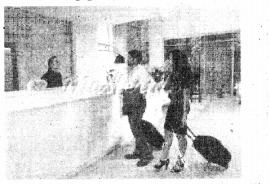
Answer:
Customer : Excuse me ! I want to book a room.
Receptionist: May I ask you fill this form please?
Customer Is there an A/c room available?
Receptionist : Yes Sir, it would cost Rs 2,500 per day for double occupancy.
Customer: No problem, could ‘ou please tell me the room number?
Receptionist : Your room number is 105 and here is our key. Kindly sign in this register please,Customer Sure. Thank you.
Rccptionist : ‘u are welcome Sir, have a nice slav.
Activity 4 :
Customer : I would like to buy a mixie.
Shopkeeper : we have er good and able brands available. Sir.
Customer : Let me sec them.
Shopkeeper : These are with three year warranty and those are with five year arranty.
Customer :
Answer:
Customer : I would like to buy a mixic.
Shopkeeper : We have all good and reliable brands.
Customer : Let me see them.
Shopkeeper : These are with three year warranty and those arc with five year warranty.
Customer : I would prefer a miscue with a five year warranty rather than the one with a three year warranty.
Activity 5 :
In an ongoing discussion over deciding the College working hours, the Principal suggests a change to
the shift system. As the secretary of the Students Association, how would you represent their preferences?
Create a conversation Student Association
Secretary : Sir, students………………….
Principal We arc forced to resort to these timings due to shortage of rooms Student Association
Secretary : Students find more convenient than
Principal : I am sorry. I can’t do much about it.
Answer:
Stundent Secretary : Sir, students prefer the old timings, because it is convenient for them to come to the College.
Principal : We are forced to resort to these timings due to shortage of rooms.
Student Secretary : Students find that coming at X O’clock is more convenient than 9 O clock as per the new timings.
Principal: I am sorry. I cant do much about it.
15. Agreeing and disagreeing

The above expressions are some vavs of agreeing / disagreeing with someone.
Study the following conversation:
(A) Tanu Schools should teach facts
Abhi I agree. I You are right.
Sur’a : I don’t think so./I disagree
(B) Sahil : 1 think we need to spend more on industry
Akash : Sodo I
Arpita : Yes, that is true, but…
You may use the following expressions:
| Agreeing | Disagreeing |
| I agree entirely. That’s a good point. (Yes) I agree (Yes) of course / Indeed. |
(I’m afraid) I don’t agree. I’m not sure. Yes, that’s quite true, but… Well, you have a point there, but…. |
![]()
Practice:
Here are some opinions. Do you agree / disagree with th.
1. Pollution in citics has increased tremendously.
2. Football is boring.
3. Space travel is a waste of money.
4. English is a very easy language to learn.
5. Strikes should be made illegal.
16. Ending a conversation : –
You meet an old friend on your way home. After exchanging pleasantries, your friend keeps talking
about his/her past. You are in a hurry as you have to take your uncle to the dentist. How do you
end the conversation?
a. Talk to you later. I have to take m uncle to the dentist.
b. I am sorry, but I have to go now. My uncle is waiting for mc to take him to the dentist.
What is the difference between the two? Which one would you prefer? Why?
Between two friends :
Rathna : Hi. Vasantha. Nice to sec you. Been away?
Vasantha : Yes, I’d been to Mysore for a week.
Rathna : Oh’ How did you like ‘our stay in Mys&e?
Vasantha : It was enjoyable. I’m. sorry I’m in a hurry. I have to catch the 4 O’clock train. It is
already 3:45. Sec you later. Bye.
Rathna : Bye.
At a friend’s house, while studying together for the examination
Dhananjava : Oh! We have completed the 3rd unit. Shall we begin with the 4th unit or shall we
take a small break.
Lakshniisagar : I’m afraid; I must go now. It is already 10 p.m. My mother ill be waiting for me.
There is no one else at home.
Dhananjaya : O.K. then. See you tomorrow in College.
Lakshmisagar : O.K. bye.
| Used for taking leave when the conversation has ended | |
| With friends | With superiors |
| See you later. See you, Bye. See you again, bye. |
Good-bye, sir / madam. |
| Used for taking leave when the other wants to continue but you want to end the conversation. |
| I’m afraid, I must go now. I hope you don’t mind my leaving. I must really be going. I am sorry, but I have………………………. (give reason for ending the conversation.) |
